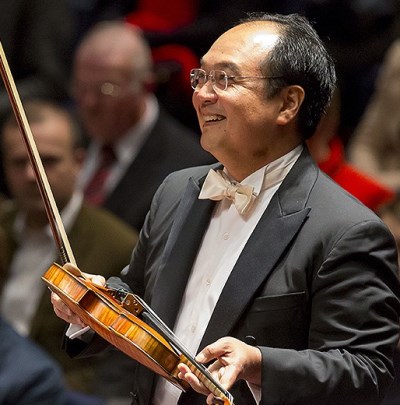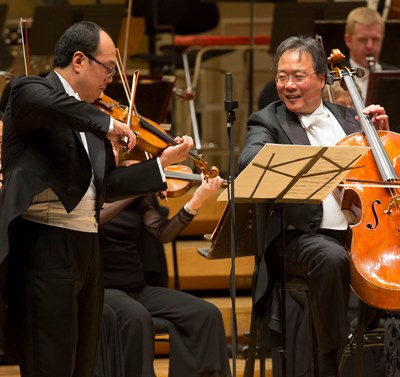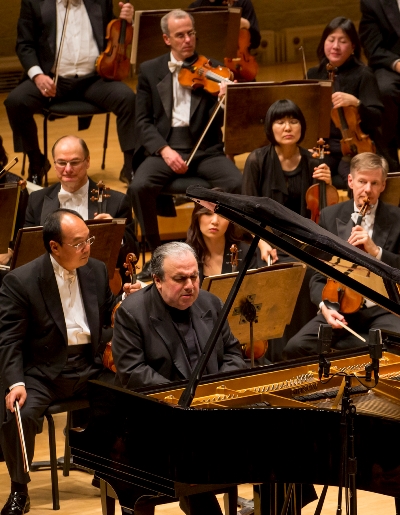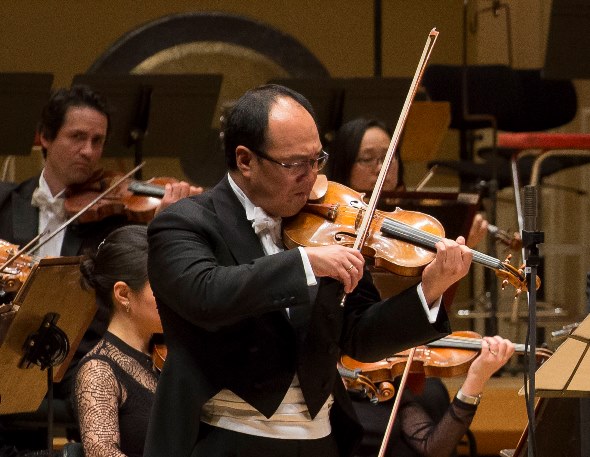As CSO concertmaster Chen takes spotlight, band behind him is like blue-blooded family
Interview: Violinist Robert Chen, soloist in Bartók April 20-23 at Orchestra Hall, says colleagues need to see him as a virtuoso.
By Lawrence B. Johnson
Every time violinist Robert Chen, concertmaster of the Chicago Symphony Orchestra, steps in front of his colleagues as soloist, he knows one thing very well: A solid troupe has his back.
Chen will be in that happy place April 20, 22 and 23 at Orchestra Hall when he plays Bartók’s early Violin Concerto No. 1 with the CSO and guest conductor Neeme Järvi. The program will get an additional performance April 21 in Wheaton.
 “You’re not going to play with a better orchestra,” says Chen in a flourish of understatement. “And I enjoy these opportunities. It’s always a privilege to perform with your colleagues as soloist. It’s also a natural extension for me. And it’s actually easier, in a way, than my usual role where I’m moving between solo passages and playing with the ensemble.”
“You’re not going to play with a better orchestra,” says Chen in a flourish of understatement. “And I enjoy these opportunities. It’s always a privilege to perform with your colleagues as soloist. It’s also a natural extension for me. And it’s actually easier, in a way, than my usual role where I’m moving between solo passages and playing with the ensemble.”
Chen, who joined the CSO as concertmaster in 1999 during conductor Daniel Barenboim’s directorship, has put together an impressive dossier of solo appearances with orchestras around the world. But he expresses particular pride in those occasions when, as musician No. 1 in the aggregation of CSO virtuosi, he can step up and put his art on full display.
“It’s important for my colleagues to hear me play,” he says. “It reaffirms their trust and belief in how I do my job. Of course, it makes everybody feel good to see that their leader is capable of standing up and playing at a world-class level, comparable to any soloist who comes through.
 “And colleagues really root for each other. When I go somewhere else as a guest soloist, that’s what I am – a guest. But here, this is my family with me. They listen with a special intensity when one of their own is playing out front. It’s a nice feeling.”
“And colleagues really root for each other. When I go somewhere else as a guest soloist, that’s what I am – a guest. But here, this is my family with me. They listen with a special intensity when one of their own is playing out front. It’s a nice feeling.”
In his nearly two decades with the CSO, Chen has seen many opportunities in the spotlight, starting with Mozart’s Violin Concerto No. 4 under Barenboim and continuing on a regular basis into the current era of Riccardo Muti’s musical directorship. Solo collaborations with Muti – including Paganini’s Violin Concerto No. 1 and the Hindemith Concerto – have been inspiring, Chen says:
“When you play as soloist with a conductor of Muti’s caliber, everything is easier. He isn’t just accompanying you. He’s an active participant in the music-making, an equal protagonist. And Muti has made a point of presenting the principals as soloists. That says a lot about his confidence and trust.”
 Mention of the Estonian maestro Järvi, an old friend of the CSO, brings a bright response from Chen. Järvi, who led a memorable performance of Sibelius’ Fifth Symphony with the orchestra earlier this season, returns as substitute for the indisposed Christoph von Dohnányi.
Mention of the Estonian maestro Järvi, an old friend of the CSO, brings a bright response from Chen. Järvi, who led a memorable performance of Sibelius’ Fifth Symphony with the orchestra earlier this season, returns as substitute for the indisposed Christoph von Dohnányi.
“Neeme is a conductor with such vast experience and interests in music over a very wide range,” says Chen. “It’s kind of neat to work with somebody like that. When Neeme’s name came up, I was ecstatic.”
The object of their collaboration is the “other” violin concerto by Bartók, whose great concerto of 1938 was long believed to be his only such work. What is now known as his Violin Concerto No. 1 lay hidden away for half a century, a love letter that both the author and the recipient chose not to make public during their lives.
Bartók was 27 years old, not yet the bristling musical lion he would become, when in 1907-08 he penned his romantic concerto in two movements as a gift for the beautiful young Hungarian violinist Stefi Geyer. But she put the manuscript in a drawer, and he swallowed his disappointment. He also re-purposed the slow opening movement as the first part of his “Two Portraits” for violin and orchestra. It wasn’t until 1956 that the original concerto came to light.
Chen, a native of Taiwan, first encountered Bartok’s early concerto as a teenager, on a recording, by – who else? – the Chicago Symphony under Georg Solti with violinist Kyung-Wha Chung. And the first time he heard the work live was after he came to the CSO as co-concertmaster with Samuel Magad, when Magad played it.
 “It’s a beautiful portrait of Stefi Geyer,” says Chen. “It’s about love, about young love. The influence of both Wagner and Strauss is very strong. And Bartók must have known Schumann’s piano music well. You get that Schumannesque sense of pianistic snapshots in the concerto. At times, the romanticism is overwhelming.”
“It’s a beautiful portrait of Stefi Geyer,” says Chen. “It’s about love, about young love. The influence of both Wagner and Strauss is very strong. And Bartók must have known Schumann’s piano music well. You get that Schumannesque sense of pianistic snapshots in the concerto. At times, the romanticism is overwhelming.”
While the Bartók may be Chen’s marquee work for the weekend, it is not the sum. He also has a featured role in Arvo Pärt’s ethereal “Fratres” (Brothers), which opens the program. But such soloistic flashes – brief “blossomings,” to use Chen’s word — are just normal duty for a concertmaster.
“It’s something I do almost weekly – these quick costume changes, the little solos, like becoming someone else in the middle of a piece,” says the concertmaster. “These spotlighted moments are always written well. They make the violin sound good. In the midst of the full sound of the orchestra, it’s a chance for the audience to hear that single voice. It gives me great joy.”
Related Link:
- Performance and ticket info: Details at CSO.org


